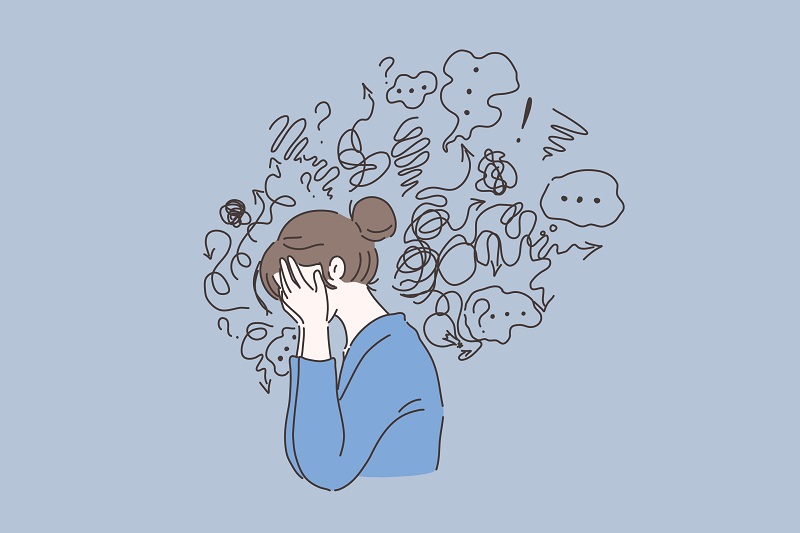Anxiety disorder? Think a bit more about yourself
Anxious people often take too much notice of the opinions of others. By thinking more about themselves and indicating their limits, the complaints can be significantly reduced. This was shown in Laura Kunst’s PhD research into an alternative treatment for anxiety disorders.

You do not dare go to a lecture or a party, or even to the supermarket. And if you do go, your legs are trembling, your heart palpitates, you feel that you could faint at any moment. Although to others nothing seems wrong, you see danger everywhere. People may laugh at you for walking strangely, or jump the queue at the checkout, and if you don’t know the answer to a question, everyone will discover that you’re not very bright.
If you suffer from anxiety, you are certainly not alone. One in five Dutch people develop an anxiety disorder during their lifetimes. The preferred treatment method is cognitive behavioral therapy (CBT). Together with a psychologist, people examine what they are afraid of, why they are afraid, and whether they can do things differently.
A cup of coffee
“For example, someone is afraid to drop a cup of coffee because they think everyone will laugh and hate them,” says Laura Kunst, a psychologist and researcher in the Department of Medical and Clinical Psychology. “You’re going to test that: drop the cup. Is it really as bad as you think, do people never talk to you again? And what does that say about your underlying thoughts?”
Talking helps. Half of the patients recover completely from their symptoms. Sometimes, it offers a lot of support to the other half. Still, according to Kunst, there is room for improvement. “An anxiety disorder limits people in their daily lives. Some can still work reasonably well; others can no longer leave the house.”
Cognitive therapy does not always work, and some people are afraid to do it because they do not want to face their fears explicitly. There are not many options then. “With most disorders you have alternatives. If you have an anxiety disorder, you do cognitive behavioral therapy, and if it doesn’t work you do it again, but for longer or more intensively. There are also variants, but after that it kind of stops.”
Caring about others
An alternative treatment method is needed, but where do you find this? In recent years, Kunst has been doing PhD research on the subject and had an inkling. It struck her that people with anxiety disorders are often a certain type of person. “They want to do very well, have everything in order. But they find it hard to speak their minds and set boundaries, they don’t really know what they want, have trouble shaping life.” They are, in other words, not autonomous.
Autonomy, according to Kunst, is the ability “to feel, express, and align your own needs, desires, and opinions with those around you.” Anxious people are usually not good at this, and that can explain a lot. “Suppose you have agoraphobia and are afraid of having a panic attack in a public place. Do you then suddenly become a person who cares very much about the opinions of others?” Or is it the other way around, Kunst wonders: do you care too much about other people’s opinions, and become anxious as a result?
Negative feelings and thoughts
What the exact link between fear and autonomy is, is still unclear. But Kunst has been able to shed more light on it. In two out of three laboratory studies, she has found that people with autonomy problems react more violently to stress.

Someone who suffers from low self-awareness becomes especially anxious when they have to present themselves. Someone who is highly sensitive to others becomes anxious after watching a film in which someone is being chased.
A questionnaire study among 5,367 participants has also shown that people with “severe autonomy problems” more often suffer from negative feelings and thoughts about themselves. They also often suffer from depressive symptoms and, yes, anxiety.
At least as striking is the fact that people who are highly autonomous, and thus better able to act on their own needs, feel better about themselves. They have, saw Kunst, positive self-esteem and good mental health. Anxiety? This plays a much smaller role.
Whatever you want
To test whether autonomy is the key, Kunst compared cognitive behavioral therapy with autonomy-enhancing therapy. She did this with 129 clients in groups, in eight treatment centers. “In groups, you can practice taking up space, and respond to that as a therapist.”
Autonomy therapy is less about the anxiety and more about the person. “What kind of family do you come from? Were you always concerned with what others needed, were you told you couldn’t do something anyway? And what did you do then?” Kunst talks about “survival strategies”: ways people teach themselves to deal with difficult situations. For example, never opening your mouth or constantly overthinking everything.
It is important in this treatment that people figure out what they themselves want and what they need to do to get it. “Otherwise, it won’t work.” A first-year student in student housing who hardly ever leaves his/her room may very well want to make friends, for example in a sports club. “Do you need advice? Do you want to know how others do it? Then you can call a friend, for example, to talk about how to create a life for yourself in the city.”
An alternative
The results, on which Kunst obtained her PhD at the end of October, are hopeful. Although the autonomy-enhancing treatment does not work better than cognitive behavioral therapy, it is just as effective. It improves self-esteem and autonomy and reduces anxiety. As a result, there are now two different treatment methods for anxiety disorders that have been scientifically proven to work.
Clinical practice seems to be warming to the idea. Autonomy-enhancing therapy was already being used, but it lacked support. That may partly explain the enthusiasm: “I’ve been inundated with messages from dozens of therapists and people from the mental health services. I was really flabbergasted.”
Kunst doesn’t want to get too ahead of herself though. “This is only one trial; we have to be careful.” For example, the group size could be expanded to get even more specific results. “We didn’t find any differences between the two groups, which doesn’t mean there aren’t small differences.” But that’s fodder for follow-up research.






